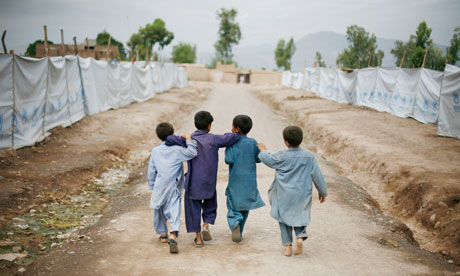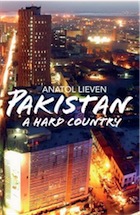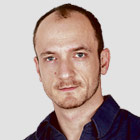Pakistan: A Hard Country by Anatol Lieven — review
Anatol Lieven's blend of analysis, history and reporting provides a rare and compelling insight into a complex, troubled nation
-
- The Observer,
Sunday 1 May 2011
- Article history
- The Observer,

What is it with Pakistan? Currently, our attention is diverted by the Middle East, but there seems little doubt that the country will return to the centre of the geopolitical stage soon. Perhaps it will be another major bombing, a battle with militants, a military coup, another humanitarian disaster such as the floods of last year. Pakistan is one of those global hotspots where temperatures remain perennially elevated – and rarely for positive reasons. Yet, despite the interest in this 64-year-old country constructed in the ruins of the British imperial adventure in south Asia, Pakistan remains opaque, obscure and frequently misunderstood.
-
Pakistan: A Hard Country
- by
Anatol Lieven
-

- Buy it from the Guardian bookshop
In this truly excellent work, Anatol Lieven, former journalist and currently professor of international relations and terrorism studies at London's King's College, sets out to teach an often ignorant public, and their usually ignorant leaders, about this complex, crucial and troubled nation. The result is a highly readable and invigorating mix of academic analysis, history and ground reporting. It should become, if not a bestseller, certainly the text of reference.
There has always been a dichotomy between the impressions of those outsiders who have spent time in Pakistan and those writing from far away. The latter often describe the country as run by Islamic militants or rogue militaries and point to its nuclear weapons, ongoing internal civil wars, support for the Taliban in Afghanistan and deep hostility to India to justify a reputation, according to Newsweek, as the "world's most dangerous country".
This is where Lieven comes in. A longtime visitor to Pakistan, he appears to have read every major work on the country and to have personally visited, even if briefly, almost all the places he writes about. Spending a month in the rough border city of Peshawar in the summer of 2008 involves a degree of personal courage that is not normally demanded of political scientists. And this ground research pays dividends. When Lieven tells us that Pakistan is "tough and resilient as a state and a society" and that "it is not always as unequal as it looks", he has the data and the case studies to back up his arguments.
Pakistan's resistance to any political cause, as much as to the constant body blows which fate and politics deliver, is rooted in the "ever present tendency to political kinship and its incestuous sister, the hunt for state patronage", Lieven says. The country's resistance to "democracy" stems from a similar source. This poses problems for western analysts, who tend to treat departures from "supposed western 'norms' as temporary aberrations, diseases to be cured or tumours to be cut out of the otherwise healthy patient's system". In fact, Lieven convincingly argues, these supposed "diseases" are the system. The only radical solution to the malady is that offered by the Islamists – though this would probably kill the patient. If Pakistan is to follow western models of progress, it will have to do so incrementally and organically, in accordance with its own nature and not western precepts. As the contrast between stymied western efforts to impose pluralist democracy in Iraq and Afghanistan and the grassroots revolts in the Middle East is showing us, it is only when an idea is not tainted with an association with the alien and foreign that it can be taken up and happily integrated into a pre-existing identity, be it Arab, Pakistani, Muslim or, say, Pashtun.
Much of the latter part of Pakistan: A Hard Country – the title comes from one of many useful quotes gathered by Lieven on his travels – is devoted to the Pashtun ethnic minority in the country and the ongoing militancy. That there is a very serious problem in the western regions is without doubt. Back in the late 1990s, when based in Pakistan for several years, I travelled regularly into the federally administered tribal areas (or Fata) for both work and, bizarre though it now seems, recreation. To try to do this now would be to risk decapitation. My most recent trip into the Fata was with the Pakistani army, who took me with them and their tanks and American-supplied attack helicopters as they expelled militants from a medium-sized town close to the Afghan border. This they achieved, but only at the cost of a few dozen soldiers' lives and the effective destruction of the town they were trying to save.
Lieven makes several useful points about the insurgency in the west of Pakistan: it is not going to force the collapse of the state; it is only the latest in a series of such uprisings that have marked that region over many centuries; it is rooted in the rapid social changes that have occurred along the porous border with Afghanistan and is thus profoundly contemporary. Lieven also raises other elements often forgotten when talking about a supposedly religious movement – such as class, land distribution and status within tribal societies. He even, usefully, cites Weber and the concept of "rational" rebels.
There are one or two flaws in this impressive work. Lieven is perhaps too quick to dismiss the impact that the rapid urbanisation and growth of the last decades have had on the strength of organised political Islamism and, perhaps more important, the consolidation of what could usefully be described as an Islamo-nationalist worldview across huge sections of Pakistani society. It is the urban middle class that is the classic constituency of such ideologies (as well as the main recruitment reservoir for military officers). Some of Lieven's references are slightly jarring in their cultural specificity – an officer is described as looking like a middle-aged David Niven – although this isn't too high a price to pay for the colourful analogies he draws with 19th-century Russia or 17th-century England. The more people who read, enjoy and learn from this book, the better.
Pakistan: A Hard Country by Anatol Lieven — review | Books | The Observer
Pakistan: A Hard Country by Anatol Lieven — review
Anatol Lieven's blend of analysis, history and reporting provides a rare and compelling insight into a complex, troubled nation


No comments:
Post a Comment